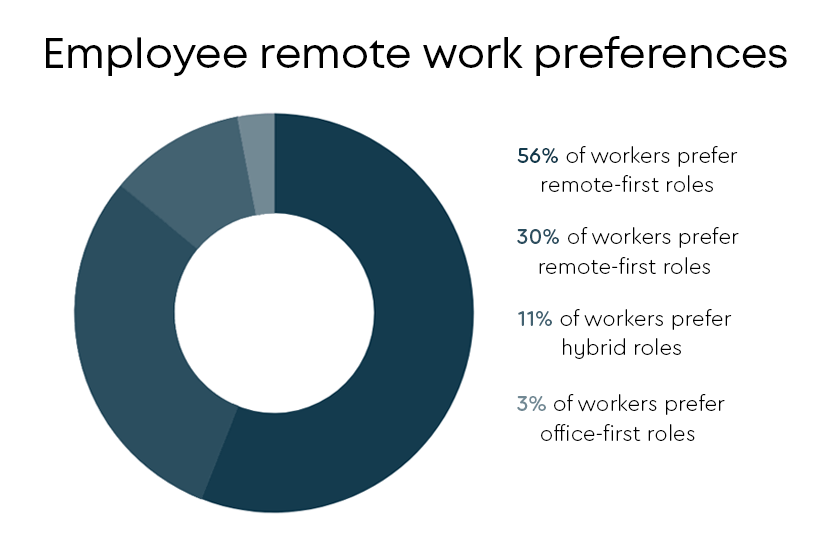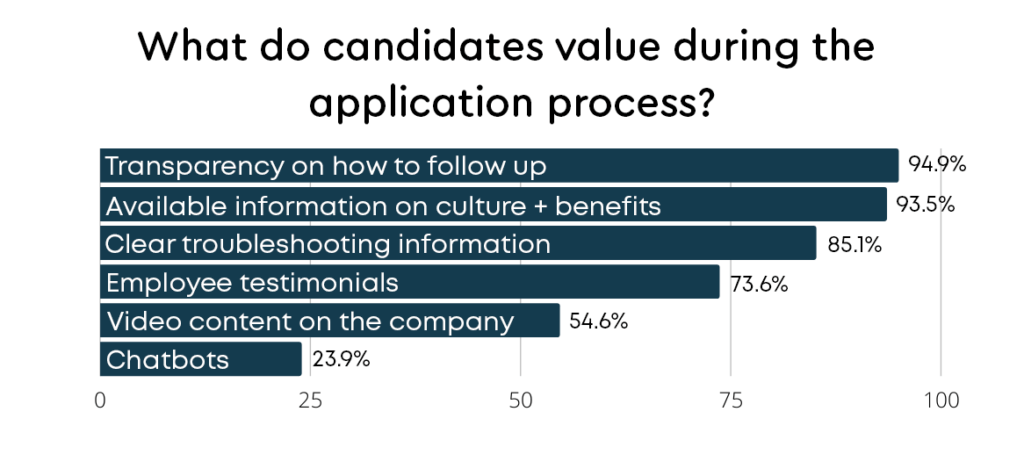How to Hire Remote Workers From Anywhere In The World
Although Jeff Bezos may say work-life balance is more of a circle than a balancing act, the truth is having a good work-life balance leads to more engaged and happy employees. Employees are fighting for more flexibility in the workplace. And that flexibility comes from the ability to choose how and where you work.
Fully remote or hybrid options are the most popular because they give employees autonomy over their time and boost work-life balance. With companies offering more online jobs and remote working opportunities comes a rise in remote recruitment.

While most recruiters don’t hire based on a “feeling”, video interviewing can be tricky for those not used to the ins and outs. We have a whole eBook on how to begin video interviewing and a training site dedicated to helping recruiters and candidates make the most of their video interview experience if you need a little help. For hiring specifically remote workers… read on for our internal process.
Building A Remote Hiring Process
The remote hiring process should look a lot like a traditional hiring process, but, obviously, online. Candidates want a transparent hiring process that lets them know exactly where they stand when they are between hiring stages.

Let your candidates know what is happening with their application through automated messaging. If they are receiving feedback and details on their application, they are less likely to drop off.
For the actual hiring stages, there are a few details to keep in mind when recruiting remote workers. Below is how we have found success hiring remote workers from other states and countries for our fully remote and hybrid team at interviewstream.
1st: Posting On A Job Board
After you write all the position details and responsibilities, define if the position will be hybrid or fully remote. We recommend putting this at the very top of the job board posting because remote workers only look for remote jobs. You can specify whether you will allow remote workers in the USA or remote workers all over the world.
As someone who has worked remotely for 5+ years outside of the USA, I don’t want to waste my time or yours if I’m not your ideal candidate. If you are open to remote workers outside the USA, we’ve written a section on how to recruit them… [link to section]
2nd: The Screening Call
As a video interviewing provider, we think on demand video interviews are a better option than a screening call, but either way, make sure you check whether your candidate would prefer phone or video (especially if they are out of the country).
We always ask if the candidate has had experience working remotely. If they haven’t, we ask about their work process and how they would like to be supported remotely.
3rd: Second to Final Round Interviews
In every interview, you get to know your possible new employee a bit more. In later interviews, we ask questions involving communication and accountability. Ask about their ideal schedule, and figure out how you can work that into your company schedule.
And – you’ll want to make sure the candidate is a good cultural fit, even when working remotely.
We’re also proponents of the behavior or competency-based interviewing approach here at interviewstream. Ask questions around how the candidate has performed in different situations in the past to see if they’ll continue to perform at the competencies you need in this remote position.
4th: Offer + Onboarding Paperwork
We extend offers on a video call and our new hires are sent the paperwork that same week. When they actually start on their first day, all paperwork should be done and they can get on with onboarding for their position.
Tips for Hiring Remote Workers
This isn’t an exhaustive list of ways to recruit remote workers (or freelancers, if that’s what you’re after), but these are how we have built hiring remote workers into our recruitment strategy.
- Outline how remote the job is. Some people don’t mind having to come into the office every month, quarter, or year, but for others, it’s really complicated to find the travel time.
- Make use of video interviews + interview scheduling. While workers in the continental USA are at most a 3-hour time difference, other remote workers and freelancers could have more of a time gap. I always appreciate an interview scheduling interface so I can respond in the moment and not wait a few days to agree on a time and date.
- Talk about what their daily schedule would be and the hours they are expected to be online. Some businesses need you to be around for the entire work day and some don’t. Either way, your candidate should know because they’ll definitely have a preference.
- Be clear on expectations of communication. At interviewstream, we have great communication within and outside of our teams, and this is super important for a remote role. If freelancers or remote workers are waiting for a few days for a response, they are losing out on time they need to do their work effectively.
- For freelancers or contractors in particular – we usually give them a sample assignment to see how well they can deliver (and if they deliver on time), and then give our feedback. It’s just as important to know how your remote employee or freelancer receives feedback as how they initially perform.
Benefits Of Hiring Remote Workers
We’re not here to convince you to join the #remotework revolution, but there are some clear advantages to belonging to the companies that hire remote workers club.
Working remotely results in more productive employees, less turnover, lower costs, a bigger candidate pool, and so much more. Let’s dive into some data…
- 61% of workers say they are more productive working remotely
- 75% say they are less likely to leave their employer if they can work remotely
- 78% of employees would recommend their company to a friend
- 84% are happier in their roles – and that translates into more engaged
- Remote recuiting widens candidate pools to include more diverse candidates. And diverse candidates can improve your bottom line by up to 36%
How To Hire Remote Workers In Other States
Hiring remote workers that live in different states is pretty simple. As long as you and your new employee are on the same page as far as schedules and work flexibility go, the only real hurdle you need to jump over is taxes.
First, find out what you need to deduct from your new employee’s payroll. Different states have different taxation laws. Second, make sure your employee isn’t being double taxed. You don’t want your employee to get taxed in the state where you have your headquarters and the state where they live (unless it’s 100% necessary, legally).
How To Hire Remote Workers In Other Countries
There is a big push for tech, product, and sales workers, and as any recruiter can tell you – they are difficult to find and retain. Opening up positions for remote candidates that live in Latin America, Europe, and other parts of the world allows you to cut recruiting times.
A few companies specialize in out-of-country payroll and compliance, for example – Deel, and we recommend hiring a professional if you’re not going to hire in volume or have a physical presence in the company your candidate comes from.
Let interviewstream Help You Hire Remote Workers
We’ve been a remote company for years (even before the pandemic) so we know our way around remote recruiting. If your remote candidates are falling through the cracks, we can close those holes with interview scheduling and video interviewing.
About The Author
Caroline Chessia is the Marketing Operations Specialist at interviewstream. She loves color-coordinated graphs, hiking in the mountains, and every dog she meets—especially the Golden Retrievers.
